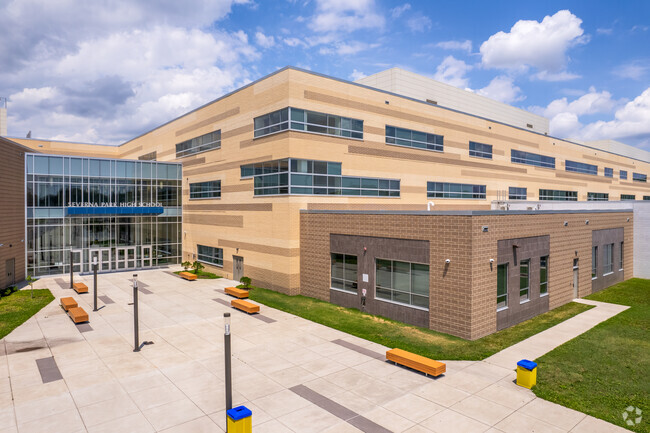How Schools Play a Vital Role in Shaping Future Leaders and Innovators
By integrating project-based understanding and interdisciplinary researches, educational establishments test pupils to examine and synthesize intricate information. Teachers serve as mentors, directing trainees and nurturing their potential, while extracurricular activities further create leadership skills and durability.
Cultivating Vital Assuming
In today's rapidly evolving globe, promoting vital assuming within academic institutions has actually ended up being paramount. As culture comes to grips with significantly intricate international obstacles, the capability to examine, evaluate, and manufacture information is crucial. Colleges play a vital duty in creating these abilities, preparing pupils to browse and deal with multifaceted problems with educated, reasoned decisions.
To grow essential thinking, teachers utilize numerous instructional techniques that urge energetic learning and intellectual interaction. Classroom discussions, problem-based learning, and Socratic questioning contribute in advertising logical and reflective idea procedures. By challenging trainees to question presumptions and take into consideration several viewpoints, these methods ensure a much deeper understanding of subject issue past rote memorization.
Additionally, incorporating important assuming throughout the educational program enhances its relevance and applicability in diverse contexts. Subjects such as mathematics, scientific research, history, and literary works each deal unique chances to create trainees' critical professors. As an example, evaluating historical events needs reviewing sources and recognizing context, while clinical questions needs extensive hypothesis testing and evidence-based thinking.
Eventually, instilling vital believing skills in pupils outfits them with the cognitive tools necessary for long-lasting understanding and flexibility. It is with this fundamental competence that future leaders will have the ability to innovate, address troubles, and contribute meaningfully to society.
Encouraging Creativity
Welcoming creative thinking within educational structures galvanizes trainees to believe beyond traditional borders and explore innovative services. By incorporating imaginative undertakings and creative thinking workouts right into the educational program, institutions grow a setting where creativity and imaginative idea are valued. This approach not just enriches the instructional experience however additionally equips trainees with the ability to take on real-world obstacles in unique means.
School can promote imagination with varied methods such as project-based learning, interdisciplinary studies, and the consolidation of arts and modern technology. Project-based knowing, for example, motivates students to use their expertise in practical, usually collective, jobs that require inventive problem-solving abilities. Interdisciplinary research studies enable students to draw links between different topics, consequently expanding their point of views and improving their creative abilities.
Furthermore, giving pupils with chances to involve with emerging innovations, such as coding and electronic design, further nurtures their innovative potential. These tasks trigger pupils to experiment, stop working, and iterate, which are essential parts of the innovative process (Save Temecula Schools). By maintaining a supportive atmosphere where trial and error is encouraged, colleges can make certain that pupils create the self-confidence to go after ingenious concepts
Basically, supporting creative thinking in instructional settings is crucial for forming future leaders and pioneers efficient in addressing complicated international issues with ingenuity.
Promoting Cooperation

Implementing group-based learning modules and participating jobs enables students to experience the characteristics of teamwork firsthand. This not just prepares them for the joint nature of contemporary workplaces yet likewise supports leadership high qualities as they often need to tackle duties such as job supervisors or group coordinators. Additionally, cooperation in the classroom can damage down social barriers and advertise inclusivity, guaranteeing that each student really feels valued and heard.
In addition, incorporating technology can even more support collective initiatives. Devices like common interactive platforms and digital work spaces make it possible for trainees to function together successfully, even outside the classroom. As pupils establish these collective abilities, they are much better outfitted to take on complicated obstacles and introduce, laying the foundation for their future roles as trendsetters and leaders.
Role of Teachers as Advisors

Mentorship involves tailored interest, where educators recognize and nurture private strengths and address weaknesses. Save Temecula Schools. Through individually interactions, instructors can tailor their recommendations and support to satisfy each pupil's distinct needs, promoting a feeling of self-confidence and resilience. This personalized method grows a development frame of mind, urging students to see failures as possibilities for learning and growth
Furthermore, instructors act as duty versions, demonstrating the worths of willpower, empathy, and honesty. Their attitudes and actions offer a blueprint for trainees to emulate, instilling a feeling of ethical obligation and social awareness. By creating a supportive and inclusive class setting, instructors make it possible for pupils to create interpersonal abilities that are essential for effective management.
Basically, the mentorship offered by educators lays a foundational structure for the development of future leaders, furnishing them with the expertise, abilities, and worths needed to succeed in an ever-evolving globe.
Effect of After-school Activities
When incorporated efficiently right into the instructional framework, after-school activities considerably boost student development and management potential. These tasks offer students with opportunities to discover interests beyond the conventional curriculum, promoting a versatile skill set. Clubs, sporting activities teams, and arts programs grow necessary qualities such additional resources as team effort, time monitoring, and web resilience. Involvement in these activities frequently requires students to handle obligations, therefore nurturing their management abilities.
Pupils involved in drama, music, or discussion clubs discover to believe critically and strategy troubles from diverse viewpoints. By collaborating with peers from various backgrounds, pupils also develop empathy and interaction skills, crucial characteristics for future leaders.
Research study shows that students involved in such programs often tend to have higher qualities and far better attendance records. Therefore, institutions that focus on a well balanced technique to education, integrating robust extracurricular programs, are extra likely to generate innovators and leaders equipped to satisfy the challenges of the future.

Conclusion
Finally, schools significantly form future leaders and trendsetters by nurturing vital thinking, creativity, and partnership amongst trainees. Engaging pedagogical techniques such as project-based discovering and interdisciplinary research studies play an essential function in this advancement. Educators, acting as advisors, provide vital guidance and assistance, while extracurricular activities further improve management prospective and resilience. By promoting a helpful atmosphere that values individual strengths and teamwork, schools furnish pupils with the essential skills to navigate future obstacles and drive advancement.
As students establish these collaborative skills, they are better furnished to take on intricate challenges and innovate, laying the groundwork for their future duties as trendsetters and leaders.
By promoting important reasoning and problem-solving skills, educators aid students navigate intricate obstacles, preparing them for management roles in numerous fields.
By working together with peers from different histories, students likewise create empathy and interaction skills, essential characteristics for future leaders.
In conclusion, institutions considerably form future leaders and innovators by supporting vital thinking, imagination, and cooperation among pupils. By promoting an encouraging setting that values individual toughness and teamwork, schools furnish trainees with the required skills to navigate future obstacles and drive technology.